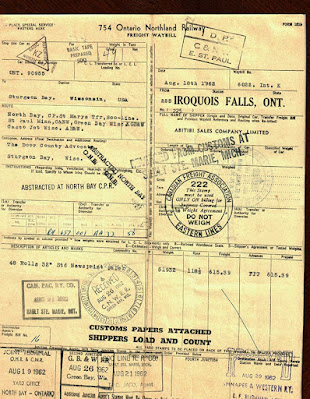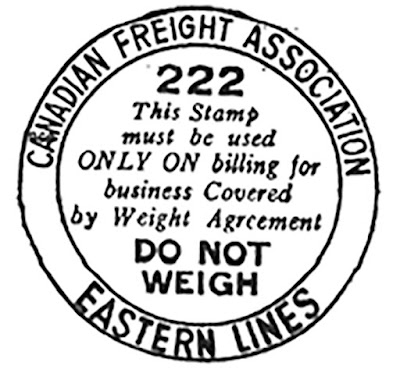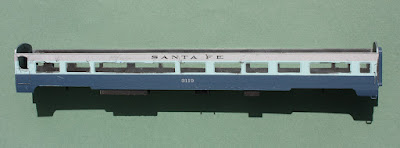I have shown previously a number of 3-D printed loads that I have chosen for use on my layout. These are, I believe, only the thin edge of a wedge of considerable changes due to 3-D printing entering our hobby. Today I want to describe a few more loads 3-D printed that I recently purchased. For those interested, here is a link to a previous post about such loads: https://modelingthesp.blogspot.com/2020/05/impressive-flat-car-loads.html .
As in the post just cited, and in others I have written about these 3-D printed loads (for example, this one: https://modelingthesp.blogspot.com/2020/06/blocking-for-big-loads.html ), these were from Multiscale Digital LLC (see their pages at: https://multiscale.digital/ and please note the photo on their home page of my flat car load of a Mesta crosshead!).
They now market through Shapeways, and if you click on their “Shop Now” button, it will take you to the Shapeways pages, where you can place orders. Be sure to check the scale of an item before reacting to the price.
Two of the loads I recently purchased are shown below, in the as-received translucent resin. On the left is a “Loewy flywheel gearbox from Bethlehem Steel,” and on the right is a “double-volute split casing pump.” For scale, the pump is 13 scale feet long. And if the name of the Loewy load sounds familiar, it’s because I showed Eric Thur’s model of it in my Cocoa Beach report last January (it’s at this link: https://modelingthesp.blogspot.com/2023/01/cocoa-beach-2023.html ).
The flywheel load (left, above) I decided to paint a kind of “machinery green,” using an old rattle car I had on my workbench. Here I wanted to achieve something like Eric Thur’s version (see link, two paragraphs above). Here’s the prototype photo Eric showed with his model.
It’s interesting to research the Loewy name (easily done on-line), through their companies, primarily Loewy Hydropress, builders of some of the largest die-forging and extrusion presses in the world. Two brothers from Czechoslovakia, Erwin and Ludwig Loewy, started to work together for the Schloemann company in Dusseldorf, Germany. They left Germany for France in 1935. In 1939, Erwin left France for the U.S. and Hydropress Inc. was established in 1940.
Below is an example of a Loewy hydraulic press at work (uncredited internet photo).
Below I show this Loewy flywheel load on a Pennsylvania flat car, with most of the blocking done (and “DO NOT HUMP” placards at each end of the blocking). PRR 474273 is a member of Class F30A.
For the pump load, I began by painting it a medium/dark gray, for which I chose Tamiya “German Grey” (TS-4). A load like this would be heavy enough to need at least some blocking to restrain movement. But the mounting plates on the pump base would have been used also to
bolt the pump to the flat car deck, so extensive blocking isn’t needed. I used scale 6 x 6-inch lumber to make some minimal blocking.
I also made a foundry sign to accompany the load, though I don’t specifically know if this was a Bethlehem product. It’s photographed on W&LE flat car 1974.
I also wanted to make a sign for the load. To find a good version of the Allis-Chalmers logo for my 1953 modeling year, I consulted this on-line source: https://theweekendhistorian.com/2012/07/04/allis-chalmers-trademarks-through-the-years/ . For versatility, I decided to make a different sign for the other side of the transformer, this one for General Electric, whose large transformer division at the time I model was in Pittsfield, Massachusetts. The familiar GE logo is readily available on the internet.
Here is the load on Milwaukee 67025, a railroad serving A-C’s home state of Wisconsin. The flat car is an ancient Devore white-metal casting (see my restoration description at: https://modelingthesp.blogspot.com/2020/08/restoring-devore-kit-part-2.html ), and models a 70-ton prototype.
Using the sign on the other side, the load can move on NYC 499056, a Walthers 90-ton car that I backdated to solid-bearing trucks, as I explained in a previous post (it’s at this link: https://modelingthesp.blogspot.com/2011/12/small-modeling-project-nyc-drop-center.html ).
These are interesting additions to my “fleet” of open-car loads, where variety is always welcome. Loads like these are distinctive enough that I don't want layout operators to recognize loads as ones they’ve seen many times. Having more of them on hand obviously helps prevent this.
Tony Thompson
















































